Social Media in Professional Practice: Guidelines and Regulations
Added on 2022-08-19
32 Pages5986 Words278 Views
Running Head: NURSING ASSIGNMENT: CASE STUDY
NURSING ASSIGNMENT: CASE STUDY
Name of the Student:
Name of the University:
Author Note:
NURSING ASSIGNMENT: CASE STUDY
Name of the Student:
Name of the University:
Author Note:
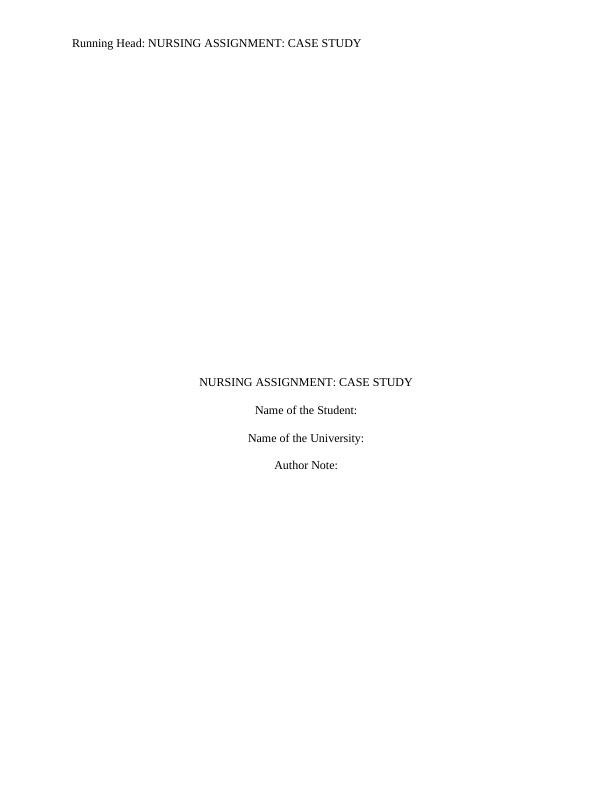
1
NURSING ASSIGNMENT: CASE STUDY
Assessment Question Satisfactory Response Tip
1. List three (3) professional bodies in nursing
that have relevant guidelines surrounding the
use of social media in professional practice.
And, for each body specify one (1) rule,
regulation or code that relates to the case study
The rapid development in Australia's usage of
mobile technologies has outperformed its
government, especially in health-care settings.
While several Australian specialist associations
and organisations have established principles
and protocols for facilitating the effective usage
of social media and mobile devices (Ventola,
2014), there is still a shortage of consistent
governance frameworks as to when, when and
how to utilize mobile technologies at the
nursing level. The three professional bodies that
follows the guideline with respect to the use of
social media in nursing practice include:
The Nursing and Midwifery Board of Australia
(NMBA) : The rules that are needed to abided
under the board’s (Bickhoff, 2014) code of
ethics is Nurses and midwives treat personal
information obtained in a professional capacity
as private and confidential. Inappropriate usage
of social media can result in causing harm to
the patients as well as their families. The harm
NURSING ASSIGNMENT: CASE STUDY
Assessment Question Satisfactory Response Tip
1. List three (3) professional bodies in nursing
that have relevant guidelines surrounding the
use of social media in professional practice.
And, for each body specify one (1) rule,
regulation or code that relates to the case study
The rapid development in Australia's usage of
mobile technologies has outperformed its
government, especially in health-care settings.
While several Australian specialist associations
and organisations have established principles
and protocols for facilitating the effective usage
of social media and mobile devices (Ventola,
2014), there is still a shortage of consistent
governance frameworks as to when, when and
how to utilize mobile technologies at the
nursing level. The three professional bodies that
follows the guideline with respect to the use of
social media in nursing practice include:
The Nursing and Midwifery Board of Australia
(NMBA) : The rules that are needed to abided
under the board’s (Bickhoff, 2014) code of
ethics is Nurses and midwives treat personal
information obtained in a professional capacity
as private and confidential. Inappropriate usage
of social media can result in causing harm to
the patients as well as their families. The harm
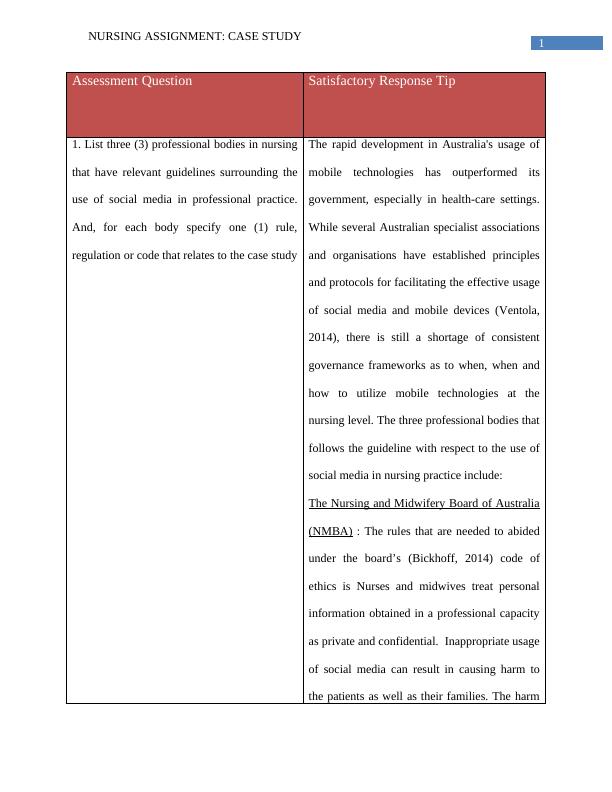
2
NURSING ASSIGNMENT: CASE STUDY
caused includes the breaching of the
confidentiality along with the defamation of the
family members or the colleagues involved.
The National Council of State Boards of
Nursing (NCSBN): The case falls under the
complying (Henderson and Dahnke, 2015) with
confidentiality and privacy obligations. The
confidentiality and the privacy policy followed
by the board needs the nurses to keep the
information learned about the patient
confidential and the information need to be kept
safeguarded by the nurse.
The Nursing and Midwifery Council (NMC):
This lays out specific standards that help them
that work on problems and behave responsibly
at all times, maintaining public safety. The
board also follows the maintenance of the
privacy of the patient’s confidential
information. (Tuckett and Turner, 2016).
2. The nurse in the case study had a
NURSING ASSIGNMENT: CASE STUDY
caused includes the breaching of the
confidentiality along with the defamation of the
family members or the colleagues involved.
The National Council of State Boards of
Nursing (NCSBN): The case falls under the
complying (Henderson and Dahnke, 2015) with
confidentiality and privacy obligations. The
confidentiality and the privacy policy followed
by the board needs the nurses to keep the
information learned about the patient
confidential and the information need to be kept
safeguarded by the nurse.
The Nursing and Midwifery Council (NMC):
This lays out specific standards that help them
that work on problems and behave responsibly
at all times, maintaining public safety. The
board also follows the maintenance of the
privacy of the patient’s confidential
information. (Tuckett and Turner, 2016).
2. The nurse in the case study had a
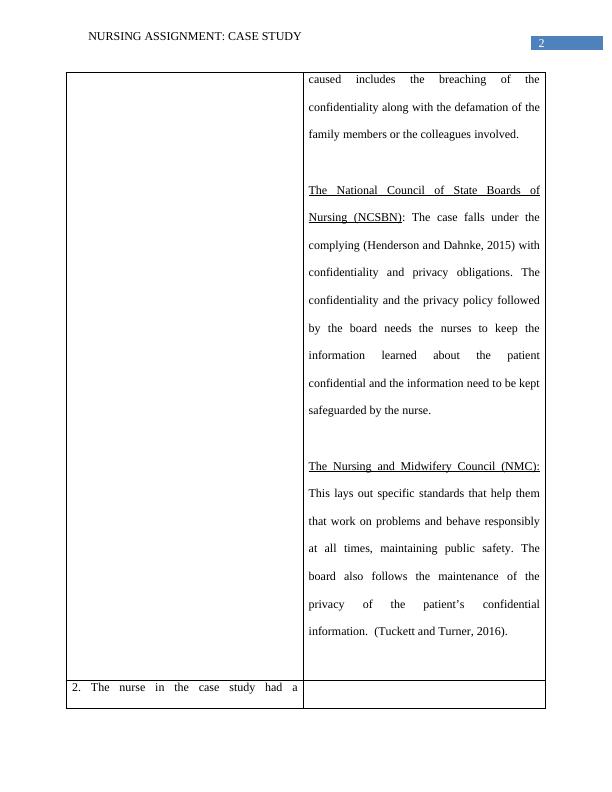
3
NURSING ASSIGNMENT: CASE STUDY
conversation about a patient over social media.
In 50 words discuss whether this is ethical
practice and if confidentiality for the patent
and her parents was breached.
It is unethical for patients, midwives or nursing
partners to address issues in health contexts that
apply to the individuals under their treatment. If
I witness my colleague has posted something
unethical responds on the basis of her case
study or patient on social media, she must
immediately reported on the basis of breaching
professional duty. Concerns (Peck, 2014)
should be raised accordingly to the higher
officials and not disclose any kind of privacy
information in front of the public eye without
the consent of the patient or their family.
Digital transmission of private knowledge may
be more detrimental than spoken
communication because of the pace at which it
can be exchanged and the scale of the possible
audience. It is necessary to note that whilst such
details does not explicitly infringe a patient's
right to anonymity while anonymised,
individuals may also be identified and this
activity may be unacceptable. The strategy to
address the issue can be created with making
my collegue understand the strictest privacy
NURSING ASSIGNMENT: CASE STUDY
conversation about a patient over social media.
In 50 words discuss whether this is ethical
practice and if confidentiality for the patent
and her parents was breached.
It is unethical for patients, midwives or nursing
partners to address issues in health contexts that
apply to the individuals under their treatment. If
I witness my colleague has posted something
unethical responds on the basis of her case
study or patient on social media, she must
immediately reported on the basis of breaching
professional duty. Concerns (Peck, 2014)
should be raised accordingly to the higher
officials and not disclose any kind of privacy
information in front of the public eye without
the consent of the patient or their family.
Digital transmission of private knowledge may
be more detrimental than spoken
communication because of the pace at which it
can be exchanged and the scale of the possible
audience. It is necessary to note that whilst such
details does not explicitly infringe a patient's
right to anonymity while anonymised,
individuals may also be identified and this
activity may be unacceptable. The strategy to
address the issue can be created with making
my collegue understand the strictest privacy
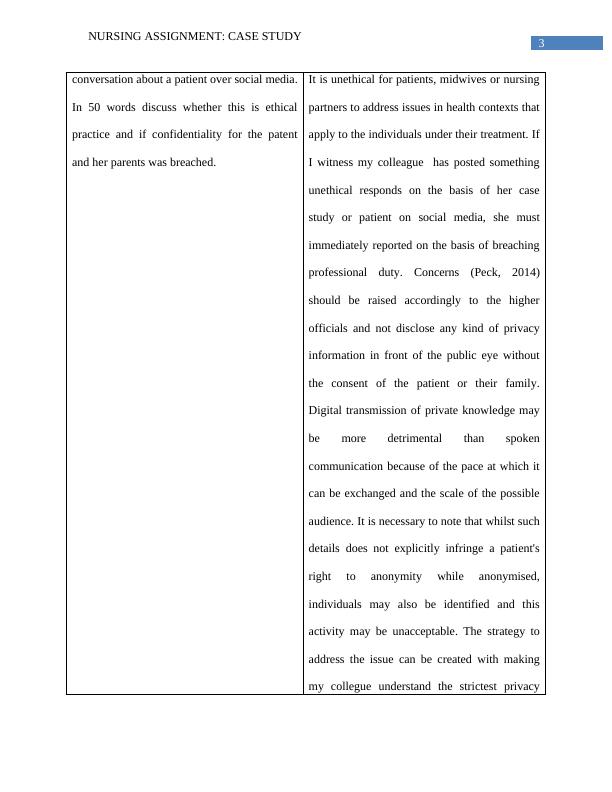
4
NURSING ASSIGNMENT: CASE STUDY
settings on the social media also have
limitations and that once something is posted, it
gets viral. Moreover, avoiding posting anything
online that might have a chance to compromise
the professionalism as well as the reputation.
3. You identify a colleague has posted
something you feel is unethical. Describe in
50 words how you would address this issue,
and how you
might set a strategy for it to be avoided in the
future.
It is unethical for patients, midwives or nursing
partners to address issues in health contexts that
apply to the individuals under their treatment. If
my colleague responds to her research or
analysis on social media, she must always
display appreciation and integrity for all her
customers or consumers of the facility by
protecting their privacy and confidentiality
privileges. Digital transmission of private
knowledge may be more detrimental than
spoken communication because of the pace at
which it can be exchanged and the scale of the
possible audience. It is necessary to note that
whilst such details does not explicitly infringe a
patient's right to anonymity while anonymised,
individuals may also be identified and this
activity may be unacceptable. The strategy to
address the issue can be created with making
NURSING ASSIGNMENT: CASE STUDY
settings on the social media also have
limitations and that once something is posted, it
gets viral. Moreover, avoiding posting anything
online that might have a chance to compromise
the professionalism as well as the reputation.
3. You identify a colleague has posted
something you feel is unethical. Describe in
50 words how you would address this issue,
and how you
might set a strategy for it to be avoided in the
future.
It is unethical for patients, midwives or nursing
partners to address issues in health contexts that
apply to the individuals under their treatment. If
my colleague responds to her research or
analysis on social media, she must always
display appreciation and integrity for all her
customers or consumers of the facility by
protecting their privacy and confidentiality
privileges. Digital transmission of private
knowledge may be more detrimental than
spoken communication because of the pace at
which it can be exchanged and the scale of the
possible audience. It is necessary to note that
whilst such details does not explicitly infringe a
patient's right to anonymity while anonymised,
individuals may also be identified and this
activity may be unacceptable. The strategy to
address the issue can be created with making
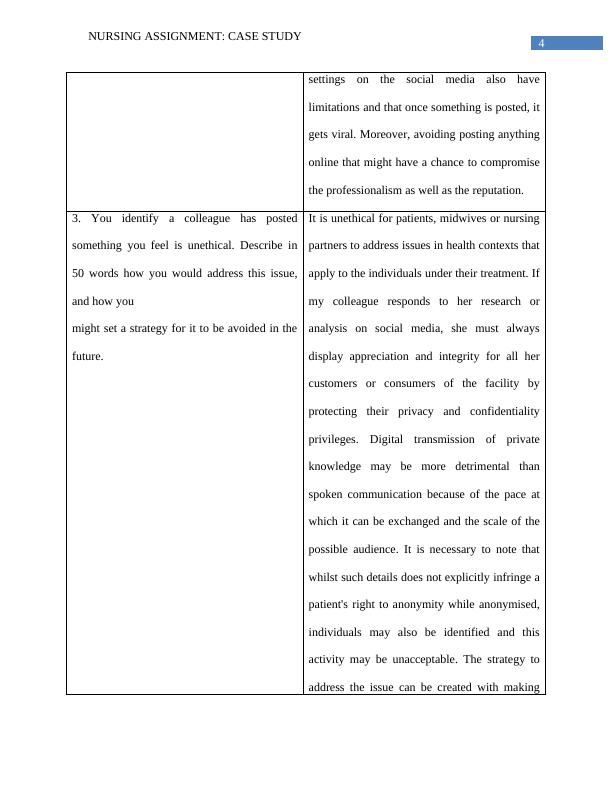
5
NURSING ASSIGNMENT: CASE STUDY
my collegue understand the strictest privacy
settings on the social media also have
limitations and that once something is posted, it
gets viral. Moreover, avoiding posting anything
online that might have a chance to compromise
the professionalism as well as the reputation.
4. Describe in 50 words what is meant by the
term ‘open disclosure’ as it relates to health
care and enrolled nurses. And, identify two (2)
healthcare professionals who have a
responsibility to provide open disclosure.
Open disclosure (Lee and Kim, 2020) is the
transparent review about harmful outcomes
resulting in injury to a individual when
accessing treatment between the individual,
their families and caregivers. The specific
standards require notification to a patient about
a health event, counseling and preparation for
personnel, voicing remorse, helping
inexperienced adults and juveniles and ensuring
medical care. The Clinical Excellence
Commission and Directors of Clinical
Governance are responsible amongst a few who
provides open disclosure.
5. In 50 words, identify how as the nurse you
would support Graham’s decision to withdraw
treatment and describe how you would
encourage him to make an informed decision.
Duty of Care is a central component of
medicine and this is perceived by several other
nurses to be an essential component of their
professional positions as nurses. Nevertheless,
NURSING ASSIGNMENT: CASE STUDY
my collegue understand the strictest privacy
settings on the social media also have
limitations and that once something is posted, it
gets viral. Moreover, avoiding posting anything
online that might have a chance to compromise
the professionalism as well as the reputation.
4. Describe in 50 words what is meant by the
term ‘open disclosure’ as it relates to health
care and enrolled nurses. And, identify two (2)
healthcare professionals who have a
responsibility to provide open disclosure.
Open disclosure (Lee and Kim, 2020) is the
transparent review about harmful outcomes
resulting in injury to a individual when
accessing treatment between the individual,
their families and caregivers. The specific
standards require notification to a patient about
a health event, counseling and preparation for
personnel, voicing remorse, helping
inexperienced adults and juveniles and ensuring
medical care. The Clinical Excellence
Commission and Directors of Clinical
Governance are responsible amongst a few who
provides open disclosure.
5. In 50 words, identify how as the nurse you
would support Graham’s decision to withdraw
treatment and describe how you would
encourage him to make an informed decision.
Duty of Care is a central component of
medicine and this is perceived by several other
nurses to be an essential component of their
professional positions as nurses. Nevertheless,
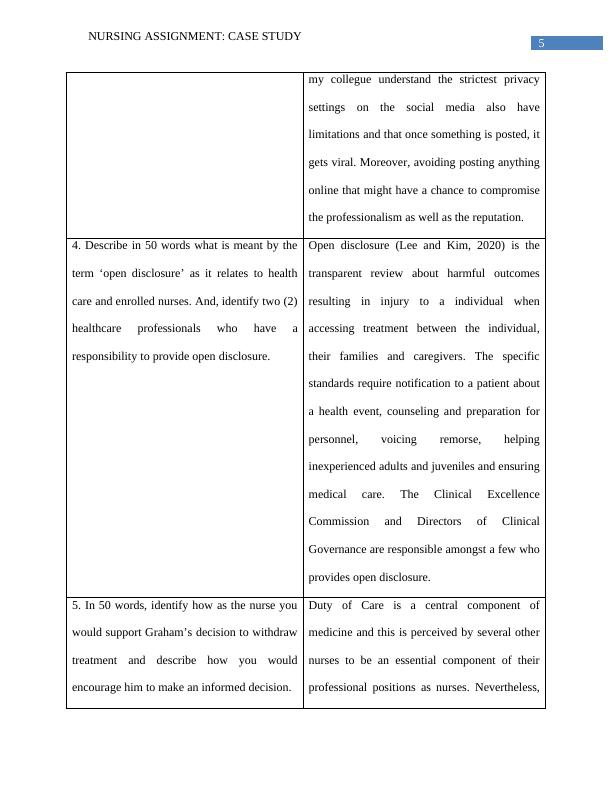
6
NURSING ASSIGNMENT: CASE STUDY
the moral framework of the obligation of care
(Lazenby et al, 2017) is sometimes forgotten,
and as such, nurses can be uncertain whether to
respond if they experience emergencies or
specific events, particularly while they are out
of duty. The case study projects that Graham, is
suffering from Hepatitis C and had undergone a
liver as well as renal failure. His doctors had
also ruled out the idea of a transplant as he was
no longer well enough. Decisions on treatment
at the end of a person's life sometimes include
concerns related to quality of life. Nurses are
expected to deliver treatment that involves
encouraging relaxation, alleviating discomfort
and other effects, and giving help to patients,
relatives, and those near to the patient.
Judgement call-making at the end of a patient's
life will take place over the years, rather than in
the minutes or days preceding the demise of a
individual. Nurses might be a tool and
encouragement for patients and family at the
end of a patient's life, both in the intervening
decision-making phase. However, Mr
NURSING ASSIGNMENT: CASE STUDY
the moral framework of the obligation of care
(Lazenby et al, 2017) is sometimes forgotten,
and as such, nurses can be uncertain whether to
respond if they experience emergencies or
specific events, particularly while they are out
of duty. The case study projects that Graham, is
suffering from Hepatitis C and had undergone a
liver as well as renal failure. His doctors had
also ruled out the idea of a transplant as he was
no longer well enough. Decisions on treatment
at the end of a person's life sometimes include
concerns related to quality of life. Nurses are
expected to deliver treatment that involves
encouraging relaxation, alleviating discomfort
and other effects, and giving help to patients,
relatives, and those near to the patient.
Judgement call-making at the end of a patient's
life will take place over the years, rather than in
the minutes or days preceding the demise of a
individual. Nurses might be a tool and
encouragement for patients and family at the
end of a patient's life, both in the intervening
decision-making phase. However, Mr
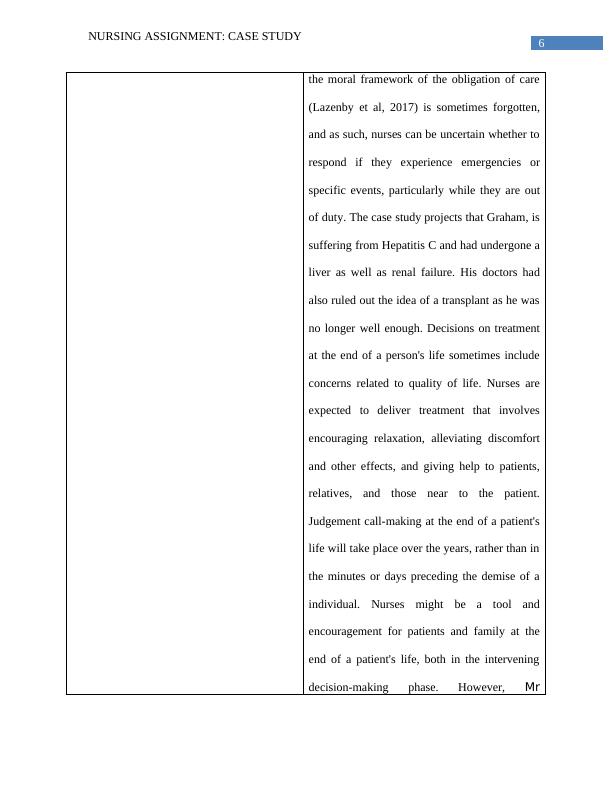
7
NURSING ASSIGNMENT: CASE STUDY
Graham's privileges about the case
study are discretion and informed
consent. Autonomy of patients is
defined as a basic ethical precept in
health care. It is the patient's
responsibility to recognize his / her
own health issues. Patients have the
ability to be active in their health care
decision-making process and health
providers will also seek to guarantee
that patients are not held against
their wishes. Referring to the case
study, Mr Graham had passed his full
content and it can be observed that
the nurse have had a detailed
discussion on the consequences that
would follow post him not taking any
medication.
6. Identify the legal requirements for the
development and use of Advanced Care
Directives and Not for Resuscitation orders in
your relevant state or territory (100 words).
Advance care preparation recognizes an
individual's freedom to determine whether they
make choices regarding their treatment. There
is no standard method for individuals to
understand whether they can make choices
NURSING ASSIGNMENT: CASE STUDY
Graham's privileges about the case
study are discretion and informed
consent. Autonomy of patients is
defined as a basic ethical precept in
health care. It is the patient's
responsibility to recognize his / her
own health issues. Patients have the
ability to be active in their health care
decision-making process and health
providers will also seek to guarantee
that patients are not held against
their wishes. Referring to the case
study, Mr Graham had passed his full
content and it can be observed that
the nurse have had a detailed
discussion on the consequences that
would follow post him not taking any
medication.
6. Identify the legal requirements for the
development and use of Advanced Care
Directives and Not for Resuscitation orders in
your relevant state or territory (100 words).
Advance care preparation recognizes an
individual's freedom to determine whether they
make choices regarding their treatment. There
is no standard method for individuals to
understand whether they can make choices
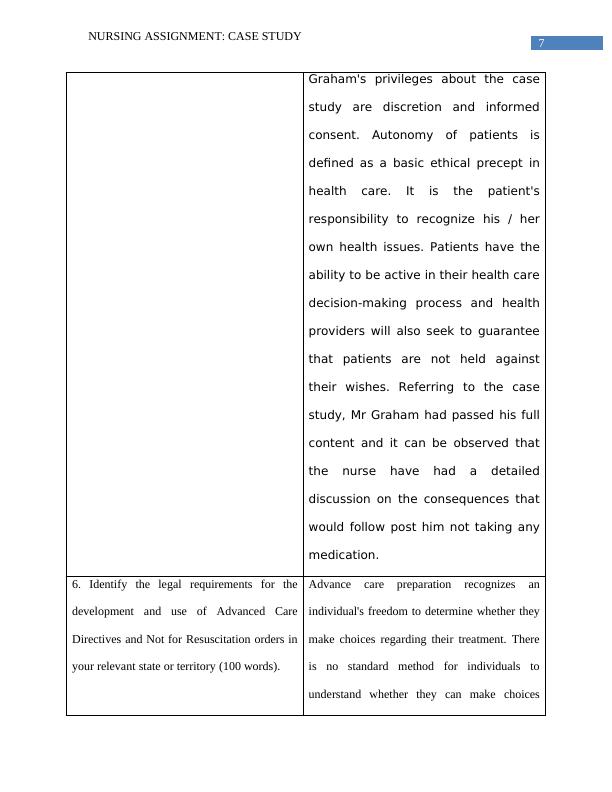
End of preview
Want to access all the pages? Upload your documents or become a member.
Related Documents
Privacy, Professionalism, and Social Medialg...
|9
|1573
|55
Patient Safety in Nursing and Healthcarelg...
|8
|1954
|15
Law, Ethics, and Professional Guidelines for Nursing Practicelg...
|11
|2908
|45
Aspect of Law-Confidentialitylg...
|5
|1437
|53
Scope of Practice in Nursing Assignmentlg...
|3
|820
|14
Nursing and Midwifery Board of Australia Standards of Practicelg...
|9
|2212
|68